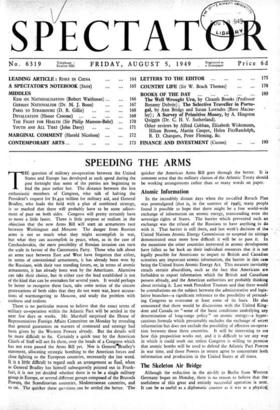SPEEDING THE ARMS
THE question of military co-operation between the United States and Europe has developed at such speed during the past fortnight that some of the parties are beginning to find the pace rather hot. The distance between the less enthusiastic members of Congress, who talk of halving the President's request for $1,450 million for military aid, and General Bradley, who leads the field with a plan of combined strategy, is so marked that there will probably have to be some adjust- ment of pace on both sides. Congress will pretty certainly have to move a little faster. There is little purpose or realism in the objection that the new Arms Bill will start an armaments race between Washington and Moscow. The danger from Russian arms is not so much what they might accomplish in war, but what they can accomplish in peace, when, as in the case of Czechoslovakia, the mere possibility of Russian invasion can turn the scale in favour of the Communist Party. Those who talk about an arms race between East and West have forgotten that either, in terms of conventional armaments, it has already been won by the Russians, with their vast standing forces, or, in terms of atomic armaments, it has already been won by the Americans. Alarmists can take their choice, but in either case the lead established is not of the kind that can be overtaken for several years. It would perhaps be better to recognise these facts, take some notice of the sincere protestations of both sides that they do not want war, leave accusa- tions of warmongering to Moscow, and study the problem with coolness and realism.
There is no particular reason to believe that the exact terms of military co-operation within the Atlantic Pact will be settled in the next few days or weeks. Mr. Marshall surprised the House of Representatives Foreign Affairs Committee on Monday by revealing that general guarantees on matters of command and strategy had been given by the Western Powers already. But the details will be more difficult to fix. Certainly a quick tour by the American Chiefs of Staff will not fix them, over the heads of a Congress which has not even passed the Arms Bill yet. Nor is General'Bradley's statement, allocating strategic bombing to the American forces and close fighting to the European countries, necessarily the last word. It is a little difficult to regard such an arrangement as final, when as General Bradley has himself subsequently pointed out in Frank- furt, it is not yet decided whether there is to be a single military group in Europe, or several different groups composed of the Brussels Powers, the Scandinavian countries, Mediterranean countries, and so on. The quicker these qu:itions can be settled the better. The quicker the American Arms Bill goes through the better. It is common sense that the military clauses of the Atlantic Treaty should be working arrangements rather than so many words on paper.


































